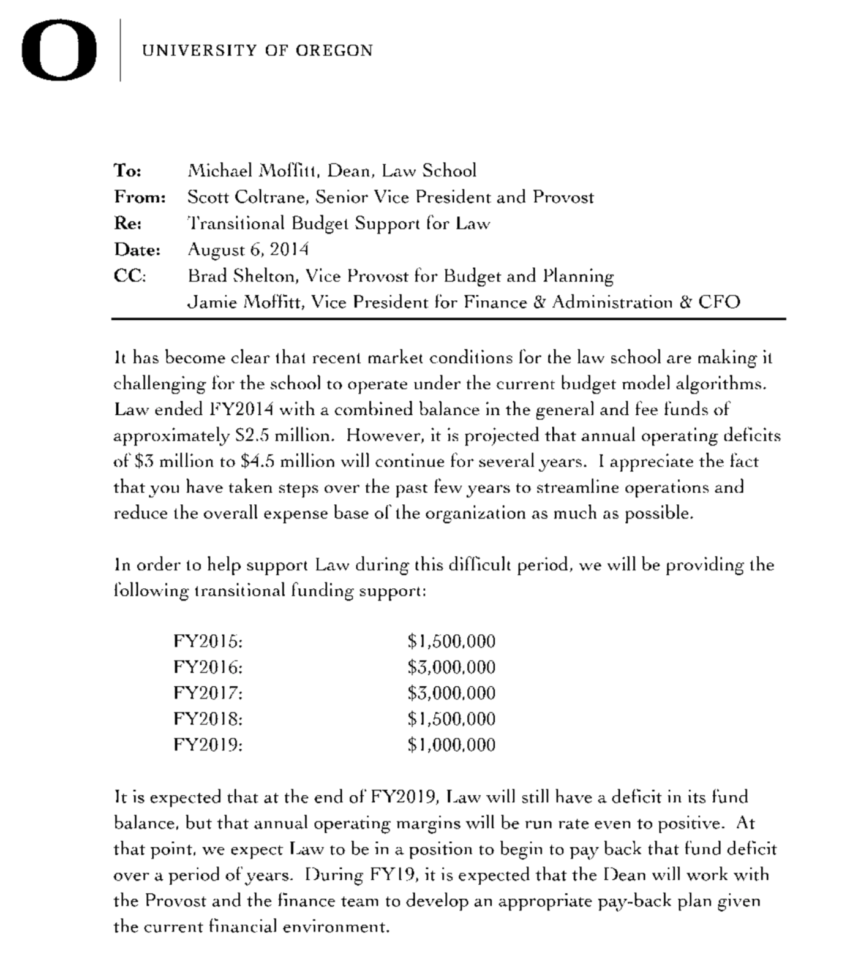About $23K each. Most of that will come from regular UO undergraduate students’ tuition payments, to discount the tuition of mostly out-of-state law school students:
According to the terms of this 2014 MOU the law school was to get a temporary bailout from UO’s general fund, peaking at $3M, then declining to $1M, with the total $10M to eventually be paid back:
This was nonsense. Not only will it never be paid back, new Dean Marcilyn Burke was able to negotiate a huge increase in the subsidy.
With listed tuition of $38K in-state, $47K out of state, and about 360 students, the law school would bring in about $15M – but their subsidy for tuition discounts will be $8.2M. Here’s last year’s breakdown:
When will this end?



When the campus is crippled, or at least greatly hampered by the expected strikes, especially academic programs, the students will be thrilled to learn where their 7% tuition increase is going.
Is this a fact, based on the UO’s budget allocation model, or an opinion? “Most of the money comes from regular UO undergraduate students tuition payments, and goes to discount the tuition of out-of-state law school students”
Might the subsidies be due to the needs of a more economically diverse in-state class?
It’s a fact. From https://law.uoregon.edu/news/oregon-law-welcomes-jd-class-of-2022-to-the-knight-law-center:
“Coming from all over the nation, approximately 75% of the Class of 2020 are from outside of Oregon and represent 29 states.”
So if all Oregon students got full tuition waivers, and only a little went to the out-of-staters, it is mathematically possible that my statement is false – but that’s not how the money gets divvied up.
UOM — are you sure that these “tuition remissions” i.e. discounts off the “sticker price” — actually translate into deficits that are covered by “operating subsidies”? i.e. is the subsidy $8.2 million, as you strongly imply? Or is it the $1.0 as in the memo you posted. Or is it something else now?
Without this information, it is impossible to evaluate your claim — Uncle Gangsta’s acerbic remark notwithstanding.
I’m low-balling the subsidy, it’s probably more like $10M.
The latest available data is 2017-18, at https://ir.uoregon.edu/files/Operational_Metrics_LAW_01092018.pdf They spent $13.2M just on personnel costs. Figure another 20% for other, you get about $16M. Add in overhead for JH, IT, Facilities etc, and you’re at at least $20M. They brought in maybe $7M from law student tuition after the discounts, and they taught another 4800 credits to undergrads at about $220 per, averaging in and out of state tuition. Let’s call it a total of $8M in tuition revenue versus costs of about $20M. Through in a few offsets from donations and you get $10M in subsidies.
No worries though, a few dozen underpaid CAS faculty teaching large science and social science lecture classes can cover it – unless the underpaid GTFF goes on strike.
If you’re right, it surely is a scandal. More than the entire 7% tuition increase on in-staters will bring in! I should listen to Gangsta, his instincts are usually sound, even if his working methods are a little crude.
Maybe UO can splain this, if they care what people think. Or maybe it’s like you say, and nothing can splain it.
My guess: they think that a place like UO can’t afford to lose the Law School, e.g. a marginal case in the AAU would become hopeless.
Cutting the remissions won’t close the law school any more than paying the subsidies will mean CAS loses grad programs. The action is on the margin. The tuition remissions get the law school somewhat better students and rankings. The subsidies mean CAS has somewhat worse graduate students and less prestigious/productive PhD programs.
I had in mind simply shuttering the law school, getting rid of the faculty and students, and being done with the losses. They would never do that, for the reasons already given, plus Schill (as long as he is here) being a former law school dean, plus possible offense to Uncle Phil.
I doubt though that they can keep operating without the subsidies. Will they still get enough warm bodies? I doubt that they enjoy giving the subsidies, if they’re really as big as you say. Maybe I’m wrong.
Maybe that ol’ Jim Bean, responsibility-centered budgeting wasn’t all bad, now that we’ve had a few years to see the consequences of the opposite?